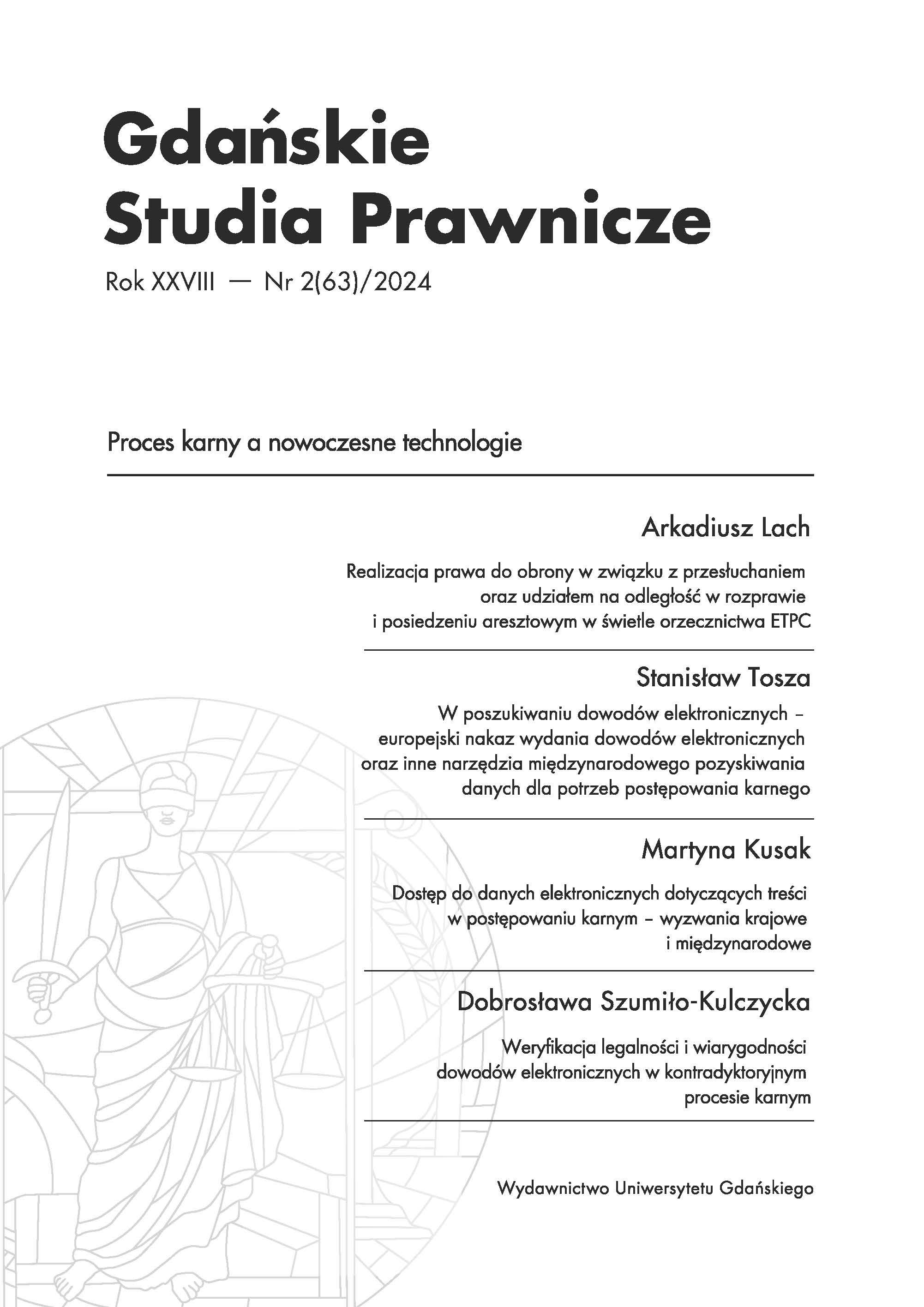W poszukiwaniu dowodów elektronicznych – europejski nakaz wydania dowodów elektronicznych oraz inne narzędzia międzynarodowego pozyskiwania danych dla potrzeb postępowania karnego
DOI:
https://doi.org/10.26881/gsp.2024.2.03Słowa kluczowe:
dowody elektroniczne, postępowanie karne, europejska współpraca w sprawach karnych, dostarczyciele usług elektronicznych, zasada terytorialności, europejski nakaz dochodzeniowy, zasada wzajemnego uznawaniaAbstrakt
W lipcu 2023 r., po ponad pięcioletnich negocjacjach przyjęto rozporządzenie w sprawie europejskich nakazów wydania i europejskich nakazów zabezpieczenia dowodów elektronicznych. Rozporządzenie to wprowadza nowy paradygmat współpracy europejskiej w sprawach karnych pozwalający na bezpośrednie wiążące żądanie przez organ jednego państwa członkowskiego wydania danych przez usługodawcę w innym państwie członkowskim, co do zasady bez udziału organów tego ostatniego. Rozwiązanie to, niepozbawione kontrowersji, jest odpowiedzią na coraz bardziej palącą potrzebę efektywnych sposobów na zdobywanie danych elektronicznych na potrzeby postępowania karnego. Celem niniejszego artykułu jest przedstawienie, dlaczego zbieranie dowodów elektronicznych nastręcza wielu prawnych i praktycznych problemów, a także jak próbowano sobie z nimi radzić. Ponadto w opracowaniu przeanalizowano zapisy nowego rozporządzenia i omówiono jego najważniejsze konsekwencje.
Downloads
Bibliografia
Clarke R.A., Morell M.J., Stone G.R., Sunstein C.R., Swire P., Liberty and Security in a Changing World. Report and Recommendations of the President’s Review Group on Intelligence and Communications Technologies, 12 December 2013, https://obamawhitehouse.archives.gov/sites/default/files/docs/2013-12-12_rg_final_report.pdf.
Corhay M., Private Life, Personal Data Protection and the Role of Service Providers: The EU e-Evidence Proposal, „European Papers” 2021, vol 6, no. 1.
Daskal J., A New UK-US Data Sharing Agreement: A Tremendous Opportunity, If Done Right, justsecurity.org, February 2016, https://www.justsecurity.org/29203/british-searches-america- -tremendous-opportunity/.
Daskal J., The Un-Territoriality of Data, „Yale Law Journal” 2015, vol. 125, no. 2.
Daskal J., Unpacking the CLOUD Act, „eucrim” 2018, issue 4.
Franssen V., The Belgian Internet Investigatory Powers Act – A Model to Pursue at European Level?, „European Data Protection Law Review” 2017, vol. 3, issue 4.
Franssen V., Tosza S., Cambridge Handbook of Digital Evidence in Criminal Matters, Cambridge 2023.
González Fuster G., Vázquez Maymir S., Cross-border Access to E-Evidence: Framing the Evidence, CEPS Papers series, Brussels 2020, https://www.ceps.eu/wp-content/uploads/2020/03/ LSE2020-02_Cross-border-Access-to-E-Evidence.pdf.
Kent G., The Mutual Legal Assistance Problem Explained, The Center for Internet and Society, 23 February 2015, http://cyberlaw.stanford.edu/blog/2015/02/mutual-legal-assistance-problem-explained.
Krishnamurthy V., Cloudy with a Conflict of Laws: How Cloud Computing Has Disrupted the Mutual Legal Assistance Treaty System and Why It Matters, Berkman Klein Center Research Publication No. 2016-3, https://ssrn.com/abstract=2733350.
Kusak M., Europejski nakaz dochodzeniowy – przełom w dziedzinie europejskiego ścigania karnego?, „Ruch Prawniczy, Ekonomiczny i Socjologiczny” 2012, t. 74, z. 4.
LaFave W.R., Search and Seizure: A Treatise on the Fourth Amendment, 5th ed., St. Paul (oct. 2017 update).
Ligeti K., Robinson G., Sword, Shield and Cloud: Toward a European System of Public-Private Orders for Electronic Evidence in Criminal Matters? [w:] Surveillance and Privacy in the Digital Age: European, Transatlantic and Global Perspectives, eds. V. Mitsilegas, N. Vavoula, Oxford–New York 2021.
Mitsilegas V., The Privatisation of Mutual Trust in Europe’s Area of Criminal Justice: The Case of E-evidence, „Maastricht Journal of European and Comparative Law” 2018, vol. 25, issue 3.
Rojszczak M., CLOUD act agreements from an EU perspective, „Computer Law & Security Review” 2020, vol. 3.
Sieber U., Neubert C.-W., Transnational Criminal Investigations in Cyberspace: Challenges to National Sovereignty [w:] Max Planck Yearbook of United Nations Law, vol. 20 (2016), eds. F. Lachenmann, T.J. Röder, R. Wolfrum, Leiden 2017.
Tosza S., All evidence is equal, but electronic evidence is more equal than any other: The relationship between the European Investigation Order and the European Production Order, „New Journal of European Criminal Law” 2020, vol. 11, issue 2.
Tosza S., Cross-Border Gathering of Electronic Evidence: Mutual Legal Assistance, Its Shortcomings and Remedies [w:] Société numérique et droit pénal: Belgique, France, Europe, sous la direction de V. Franssen, D. Flore, Bruxelles 2019.
Tosza S., Internet service providers as law enforcers and adjudicators. A public role of private actors, „Computer Law & Security Review” 2021, vol. 43.
Tosza S., Mutual Recognition by Private Actors in Criminal Justice? E-Evidence Regulation and Service Providers as the New Guardians of Fundamental Rights, „Common Market Law Review” 2023, vol. 61.
Tosza S., Mutual Recognition by Private Actors in Criminal Justice? Service Providers as Gatekeepers of Data and Human Rights Obligations, September 19, 2019, https://papers.ssrn.com/sol3/ papers.cfm?abstract_id=3517878.
Tosza S., The E-Evidence Package is Adopted: End of a Saga or Beginning of a New One?, „European Data Protection Law Review” 2023, no. 2.
Pobrania
Opublikowane
Jak cytować
Numer
Dział
Licencja
Prawa autorskie (c) 2024 Gdańskie Studia Prawnicze

Utwór dostępny jest na licencji Creative Commons Uznanie autorstwa – Użycie niekomercyjne – Bez utworów zależnych 4.0 Międzynarodowe.

 Uniwersyteckie Czasopisma Naukowe
Uniwersyteckie Czasopisma Naukowe




